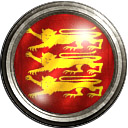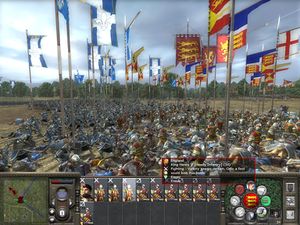Difference between revisions of "England (M2TW Faction)"
(Done) |
m (image added) |
||
| Line 24: | Line 24: | ||
==Units== | ==Units== | ||
| − | + | [[Image:England_v_france.jpg|thumb|right|English and French units in battle.]] | |
===Infantry=== | ===Infantry=== | ||
*Peasents | *Peasents | ||
Revision as of 16:21, 24 October 2008
| England (M2TW Faction) | |
|---|---|
 | |
| Name: | Kingdom of England |
| From Game: | Medieval II: Total War |
| Religion: | Catholic |
| Culture: | Northern European |
| Playable: | |
Contents
Overview
At the game's start in 1080, England's position is hopeful. They are surrounded by Rebel settlements, the Scots to the North, The French to the South and already have castles in place on either side of the Channel (Nottingham, Caen and London).
From these castles, conquering and developing the conquered rebel provinces from Rennes to Antwerp can create a strong high period economy, especially if Caenarvon is converted to a city. Another possible route the English King can take would be to unite the British isles first, concentrating all military efforts on quickly destroying the Scots in as short a time as possible, thus avoiding Excommunication. Although this tends to be less lucrative than developing a Kingdom on both sides of the English channel, it is more secure.
Though they do face trouble on multiple fronts, due to their position. The Scots to the north are isolated from the rest of Europe, and do not have a strong ally from the mainland. The French Royal forces are have enough fronts to deal with right now that they are unlikely to be able to drive them from the continent anytime soon.
The English navy can be used to fight, and to transport troops through long stretches of hostile waters unlike the navies of Byzantium, Venice or Portugal. A weakness that England have is their complete lack of missile cavalry, and must rely on mercenaries if such a need arises.
Campaign Information
Campaign Strategy
The English faction begin with three provinces, with castles at Nottingham, Caen and their capital city, London. The first threats start with Scotland to the North and the French to the South. Their are many Rebel towns nearby, the closest being York.
Early English armies are made up of Levy Spearmen and Spear Militia, reinforced by Mailed Knights and Hobilar cavalry. Powerful English infantry, Longbowmen are often used in battle, but the English cavalry does not offer the power and variety as rival factions.
Campaign Objective
Hold 45 regions, including: Jerusalem Province.
Units
Infantry
- Peasents
- Town Militia
- Levy Spearman
- Spear Militia
- Armoured Sergeants
- Armoured Swordsmen
- Bill Militia
- Billmen
- Dismounted English Knights
- Dismounted Feudal Knights
- Heavy Bill Militia
- Heavy Billmen
Missle
- Archer Militia
- Arquebusiers
- Longbowmen
- Peasant Archers
- Retinue Longbowmen
- Sherwood Archers
- Yeoman Archers
Cavalry
- Demi Lancers
- Hobilars
- Mailed Knights
- Merchant Cavalry Militia
- English Knights
- Feudal Knights
- Early General's Bodyguard
- Late General's Bodyguard
- Knights Hospitaller
- Knights Templar
Artillery
- Ballista
- Catapult
- Ribault
- Trebuchet
- Bombard
- Culverin
- Mortar
Infantry Details
Aside from the early period, English infantry is of high quality. Like all factions they gain the standard town, spear and archer militia, but also gain bill militia and heavy bill militia. Although they both have weak defensive stats (standard bill militia being only 3 in total), they are effective against amour and have a good attack, meaning that both units are far better suited to guarding a city's walls, as it's likely that walls will be assaulted by foot soldiers. The best use of them would be to use bill militia where it's likely the enemy will use ladders, and heavy bill militia where they will use towers.
English infantry trained in castles is of even higher quality, and are even effective against cavalry, provided that the unit survives the charge. Dismounted English Knights are among the most powerful offensive infantry in the game, are effective against armour and can hold there own against nearly any enemy infantry.
England also has access to armoured swordsmen, who are basically DFK with a cheaper upkeep and the ability to upgrade its armour, which makes this unit so effective that it never really becomes obsolete,allowing them to constantly build up experience. Armored swordsmen are excellent against the infantry of Eastern Europe, the Middle East, and Italy, particularly against dismounted Broken Lances, who they will massacre in close combat.
Missile Details
English archers are amongst the finest available in the game. Upon gaining the unique Woodman's Guild, archers trained start with more experience.
Due to their ability to lay stakes that effectively cut off cavalry from one direction and double as light infantry, it is reasonably safe to leave skirmish mode off for English archers, and hide them behind a line of stakes. These abilities make the English archers, particularly the Retinue Longbowmen, some of the best in the game.
England also has access to the Sherwood archers, which can hide anywhere while having a high missile attack value, making them perfect for ambushes.
English gunpowder troops are lacking and aren't really worth the price you have to pay for the infrastructure required to build them, especially when yeomen and retinue longbowmen still outclass them in terms of range and utility.
English artillery is also lacking (although for settlement defense they do gain the use of mortars), with no real unit that's effective as field artillery such as a monster ribault or serpentine, and their cannon for use against walls being the culverin instead of the basilisk, grand cannon or monster bombard that are available to other factions.
All things considered, longbows will make up the core of most English armies.
Cavalry Details
English cavalry lacks in variety, being composed of the standard knights available to all factions. There are, however, the unique hobilars, which make effective light cavalry and excel at chasing down missile cavalry.
English knights have a high charge value and are armed with armour piercing poleaxes, making them highly effective at confronting other mid-game knights, however they will struggle against elites such as Gendarmes or the mighty French lancers.
Demi-Lancers are trainable from military academies, and are the faster, weaker version of the French lancers.
In Conclusion
England is a defensive faction, who are best suited for defending a hill, or any other defensive position. Their armies should be deployed with longbowmen in front of supporting melée infantry but behind stakes, with English knights, both dismounted and mounted, on the flanks to make sure no enemy cavalry tries to maneuver around the army.
In terms of siege defense, England are possibly the best faction in the campaign, as stakes can be deployed in front of settlement gates or roads, and once the battle starts the longbows can be moved onto the walls where they can reap a heavy toll on any advancing foot knights and stand a good chance of winning any melee battle with the survivors, whilst mortars hide behind the walls and target enemy siege engines.
A possible way to force a defensive battle is to besiege a settlement then wait for another army to try and lift the siege.
England see their military zenith in the high period, so all efforts must be made to crush factions that are strong in the late period before they have a chance to bring their best units to bear (Venice, France, Milan etc), unless harder battles are what you look for in the campaign.
| Medieval 2: Total War | Factions: |
|---|
| Aztecs | Byzantine Empire | Denmark | Egypt | England | France | Holy Roman Empire | Hungary | Milan | Mongols | Moors | Papal States | Poland | Portugal | Russia | Scotland | Sicily | Spain | Timurids | Turks | Venice | Rebels |
